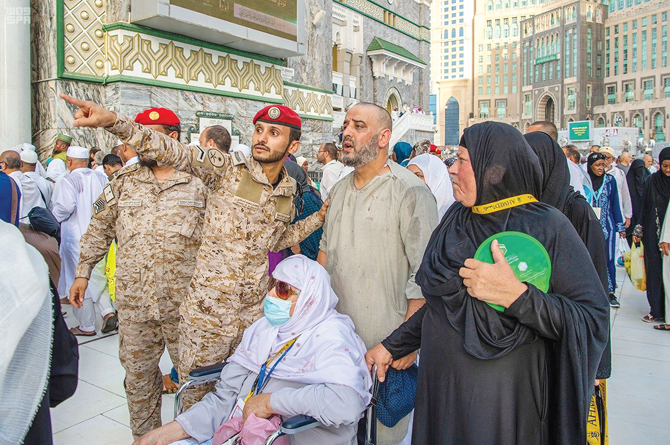MAKKAH: Saudi Hajj and Umrah Minister Dr. Mohammed Salih Bentin said Qatari citizens know that the Kingdom is open to them and they are welcome to visit.
In an exclusive interview with Arab News, Bentin said: “We have called the Qatari Hajj mission to come like all other Muslim countries. We asked them for the expected number of pilgrims. When the time to sign the agreements came, they did not do so. So, we could not know who their licensed Hajj agencies were. Saudi Arabia then launched websites for the Qataris to register and choose between the available services. We were surprised to see that the link was blocked by Doha.
“Despite the pressures on our brothers who would like to perform Hajj, they understand that Saudi Arabia is open to them. Airports, camps and services are all available. They are welcome.”
Addressing the Kingdom’s preparations for the Hajj season, the minister said: “There are over 350,000 people working for pilgrims from both the public and private sector.”
He added that in Makkah, preparations are intensified to guarantee a safe environment.
“All Makkah citizens are delighted to see pilgrims come to their city. They do not experience any disorder or traffic congestion. This could not happen without our proficient efforts to deal with huge numbers of people,” Bentin said.

Hajj security forces have affirmed that pilgrims’ safety and security is a red line, stressing that they won’t let anything disrupt them. (SPA)
“The Makkah Route initiative helps pilgrims organize Hajj procedures in their countries without needing to visit the Saudi Embassy. Their flights to Saudi Arabia are similar to a domestic flight. There are no restrictions as long as they are only coming to perform their religious duties,” he added.
“Even passengers who travel through private or executive lounges rarely enjoy such services. Once their planes arrive, worshippers take buses directly to their residences. They do not even need to wait for their luggage. There are workers who take their baggage to Makkah,” Bentin said.
The minister discussed the smart Hajj platform, which offers advanced services to help pilgrims, including an online electronic visa application process. “The platform also includes a smart Hajj card that holds a pilgrim’s personal, medical and housing information. It can be quickly read using electronic scanners. The card also provides assistance to worshippers who are lost and controls entry to Hajj tents,” he said.
The minister said that the Royal Commission for Makkah City and Holy Sites is developing the holy sites to accommodate as many pilgrims as possible. “Makkah has a limited capacity. However, managing Hajj is a complete system covering entry ports, residences in Makkah, Arafat, Muzdalifah and Mina, where over 2 million pilgrims gather for stoning the pillars. The Holy Mosque also has a strict capacity,” he said.
“We measure the rate of satisfaction through the Guests of God Service Program. There are also indicators to measure performance, where results specific to Hajj are submitted to the economic council. Moreover, the National Center for Performance Measurement reports about the performance of bodies working during the religious season,” Bentin added.
He said his ministry is working with three independent entities to measure the satisfaction of pilgrims.
“There are other governmental bodies that assess the quality of services provided, including the Makkah region’s governorate, King Abdul Aziz University and the Custodian of the Two Holy Mosques Institute for Hajj and Umrah Research,” he added.
“The orderly movement of pilgrims and the services provided to them reflect the substantial efforts we provide to worshippers. This cannot be repeated elsewhere, except in Saudi Arabia,” he said.
“A common concern we hear is the number of bathrooms in Mina. When worshippers come from a spacious area to Mina, they often feel disappointed,” Bentin said.
The minister added that the Royal Commission for Makkah City and Holy Sites, the Makkah Region Development Authority and the Ministry of Hajj and Umrah are looking to add more toilets without reducing the total area of Mina.
Bentin said that Hajj is not a challenge to Saudi Arabia considering the desire to serve worshippers. “There is at least one person in every house in the Kingdom working at the service of pilgrims, whether they are in the Road Security Forces, sea or air ports, entry points, customs departments and restaurants. The service of pilgrims runs in the blood of all Saudis,” he said.
He added that Saudi Arabia has become a global leader for mass management service. “We receive pilgrims who come from mountainous areas and have not seen a city in their countries. Some of these worshippers have struggled for a long time to save money in order to come and perform their rituals. Some other pilgrims come from advanced countries and are enjoying luxurious lives. Our ambition is serve these pilgrims in an appropriate way that better represents Saudi Arabia,” he said.
Bentin added that workers feel overjoyed when they see a poor pilgrim ride an air-conditioned bus or eat from a plate for the first time. “This is not a challenge, we feel happy to provide them these new experiences,” he said.
The Royal Commission for Makkah City and Holy Sites is conducting studies to increase the number of Umrah performers to 30 million and Hajj pilgrims to 5 million in compliance with the Vision 2030 reform plan. “The commission is looking to enhance all services for pilgrims. In the past, each Hajj entity used to independently conduct its own studies, but now the commission is doing it all,” Bentin said.














